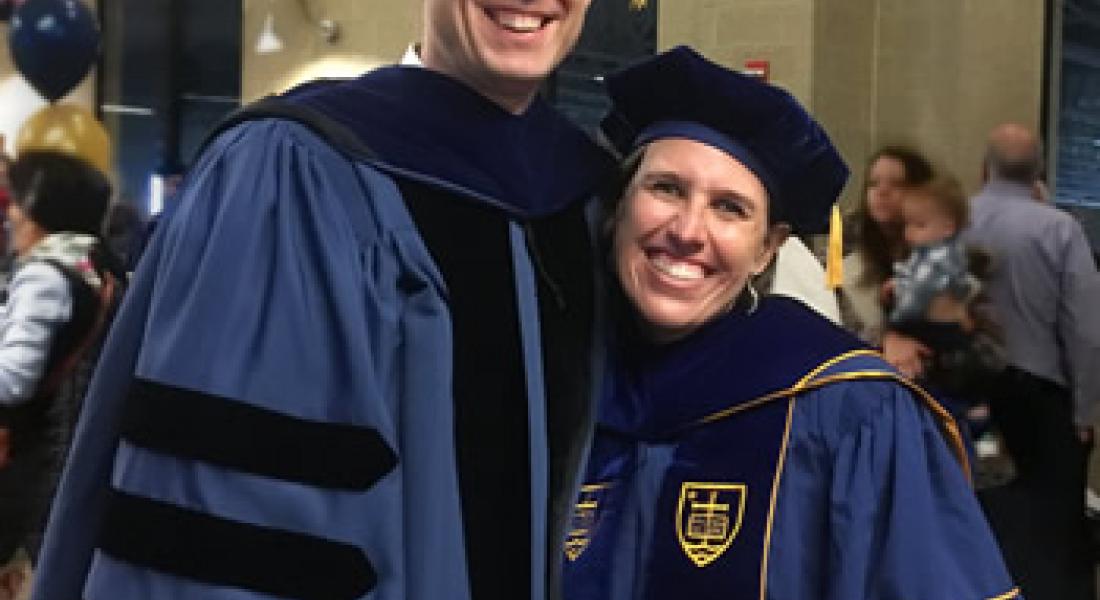
Kellogg PhD Fellow Laura Gamboa Gutiérrez has won the 2017 Eli J. and Helen Shaheen Graduate School Award, the highest honor bestowed on Notre Dame graduate students. Gamboa, who received her PhD in political science in July 2016, accepted the award in the social science category during a ceremony on May 19.
“It is really exciting to get this award,” says Gamboa, now assistant professor of political science at Utah State University. “In academia recognition is hard to get, and when you do it is encouraging. The signal is ‘keep doing it!’”
Gamboa’s dissertation committee was composed entirely of current or former Kellogg faculty fellows: Michael Coppedge, Scott Mainwaring, and David Nickerson.
“I am enormously pleased that Laura has won the Shaheen Award,” said Mainwaring, who chaired the committee. “Laura was among the best students I taught at Notre Dame.”
“She wrote an agenda-setting dissertation that is of great relevance in contemporary world politics, [focusing on] democracies that are being undermined by presidents who do not tolerate legitimate oppositions. Based on extensive fieldwork in Venezuela and Colombia, the dissertation explains the traps that democratic oppositions should avoid in contexts in which democracy is endangered by these illiberal presidents.”
“I don’t think without Kellogg I would have written this dissertation—or any dissertation at all,” Gamboa says.
A supportive Kellogg community
She cites funding—her PhD fellowship followed by the Dissertation Year Fellowship that allowed her to complete the dissertation—but beyond that the supportive Kellogg community and its normative research concerns.
“I got the idea for my dissertation from a Kellogg Tuesday lecture, workshopped the proposal at a Kellogg comparative politics workshop, and presented drafts at other Kellogg workshops, including a work-in-progress session,” she says.
Along the way, she received feedback from fellow graduate students, faculty fellows such as Guillermo Trejo, and “all the people from many disciplines that pass through Kellogg”—legal scholars, sociologists, and anthropologists as well as political scientists like former Visiting Fellows Ana Arjona, James Loxton, Kristin McKie, and George Tsebelis.
“I wouldn’t have written the dissertation of the same quality without that feedback,” she says. “Kellogg fosters a very constructive environment.”
Thinking big
Since she has left Notre Dame, Gamboa has come to realize how political scientists are often encouraged to ask small questions, appropriate to causal inference—but how at Notre Dame and particularly at Kellogg, she was encouraged to “think big” about questions of normative importance.
Doctoral students trained in this special environment think about their work differently than many of those trained elsewhere, she asserts.
“We care about the world and how our work could help the world in some way,” she says. “That’s part of the legacy of Kellogg founding director Guillermo O’Donnell.
Kellogg was born out of concern for the world, to improve democracy and end dictatorships in other countries,” she explains. “To think about this world and to make it a better place…that inheritance brings Kellogg graduate students together. I couldn’t imagine a better place to do my PhD—it feels like home.”
Currently, Gamboa is turning her dissertation into a book, adding more cases from Latin America, Eastern Europe and the Middle East. She also continues to collaborate on projects with PhD Fellow Juan Albarracín and former PhD Fellow Sandra Botero, who takes up a new position at Universidad del Rosario in Bogota this summer.
“Laura has established a strong research agenda beyond her dissertation,” says Mainwaring.
“Says Who? An Experiment on Allegations of Corruption and Credibility of Sources” appeared in Political Research Quarterly 68, 3 (2015), coauthored with Nickerson and Kellogg doctoral student affiliates Botero, Rodrigo Castro-Cornejo, and Nara Pavão. An article summarizing Gamboa’s dissertation argument is forthcoming in Comparative Politics in July.
She also coauthored a chapter on Colombia for Party Systems in Latin America: Institutionalization, Decay, and Collapse (Cambridge University Press, forthcoming), edited by Mainwaring.
“It is a sign of my confidence in Laura that I invited her to write this chapter,” he says, noting that faculty from Cornell, Harvard, Michigan, Northwestern, Oxford, Texas, and Vanderbilt contributed to the volume, which originated in a 2014 Kellogg conference.
Shaheen Award
This is the third time in five years that a member of the Kellogg doctoral student community from the Department of Political Science has won the Shaheen Award. Kellogg PhD Fellow Carlos Gervasoni, now at Universidad Torcuato Di Tella in Buenos Aires, received the social science honor in 2012 and Dissertation Year Fellow Nara Pavão received the award in 2016. She now teaches at the Federal University of Pernambuco (UFPE) in Brazil.
The Shaheen Awards, which carry a $2,500 cash prize, recognize one outstanding graduate student from each of the four divisions of the Graduate School: humanities, social sciences, science, and engineering. The awards recognize excellence in any one or a number of areas: grades, research and publications, fellowships or other awards, teaching, and mentoring.
The Kellogg Institute for International Studies, part of the University of Notre Dame’s new Keough School of Global Affairs, is an interdisciplinary community of scholars and students from across the University and around the world that promotes research, provides educational opportunities, and builds linkages related to two topics critical to our world—democracy and human development.





